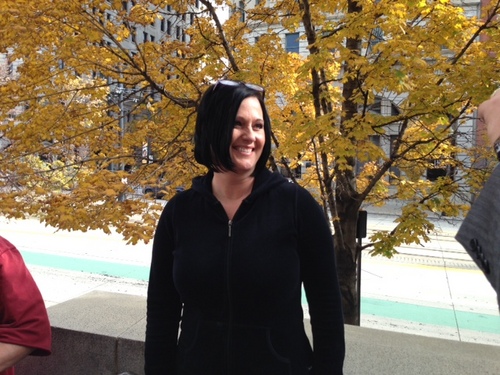This is an archived article that was published on sltrib.com in 2013, and information in the article may be outdated. It is provided only for personal research purposes and may not be reprinted.
For Sharon Weeks, it was like someone hit the rewind button.
Nearly two decades ago she listened as medical experts debated whether Ron Lafferty was competent to stand trial a second time for the 1984 murders of her sister, Brenda Wright Lafferty, 24, and 15-month-old niece.
On Friday, Weeks listened once more as experts offered differing views of Lafferty's competence and his ability to assist his attorneys, who claim he is too delusional to help them as they appeal his death sentence in federal court.
"It is nothing that I haven't heard before," said Weeks, 45. "I'm fairly confident the outcome will be the same, as it has in the past."
That outcome will soon be in the hands of U.S. District Judge Dee Benson, who opened the second day of Lafferty's competency hearing to the public after deciding nothing being discussed violated the "forbidden territory" of attorney/client privileged communication. It will be about a month before attorneys for the state and for Lafferty submit final arguments for Benson to use in deciding whether to stay the federal habeas proceeding.
Lafferty, now 71, appeared in court wearing an orange prison jumpsuit and shackles. His sandy hair is graying slightly at the edges of his face and he has a thick, bushy mustache. He frequently engaged in conversation with attorney Sarah E. Stone, a Federal Public Defender from Arizona, often writing on a legal pad and passing notes on hot-pink sticky pad paper to other attorneys.
At certain points, Lafferty nodded his head in vigorous agreement as psychiatrist Noel C. Gardner, who testified for the state, explained why he believes the death-row inmate is competent and described Lafferty's views.
Lafferty shook his head negatively as psychiatrist Michael First, hired by the defense, testified that Lafferty was delusional and unable to rationally assist his counsel in federal appeals ultimately aimed at blocking his execution.
Lafferty gave the doctor the middle finger once when First said he was psychotic, and Lafferty circled his finger near his head in a "crazy" motion to signal his disagreement with First's comments.
Lafferty and his brother Dan were convicted of murdering Brenda, who was married to their younger brother, and her daughter, on July 24, 1984, at their home in American Fork. Brenda was beaten and both she and her daughter's throats were slashed.
Dan Lafferty, now 65, received a sentence of life without parole for his role in the murders. Ron Lafferty was sentenced to death in 1985. A federal appeals court overturned Ron Lafferty's conviction in 1991 after finding the wrong standard was used to assess his mental competency. After again being found competent, a new trial took place in 1996. Lafferty was convicted and given a death sentence for a second time.
Lafferty exhausted his state appeals in 2007 and then began the federal process. His attorneys have contested his competency since 2009.
Thomas Brunker, an assistant Utah attorney general, argues Lafferty's current mental health is immaterial since federal appeals are a review of the state trial record — a position backed by a recent U.S. Supreme Court ruling that a defendant does not need to be competent for such "backward-looking" reviews to proceed.
"We've opposed the process throughout," said Brunker, who filed an amicus brief on behalf of numerous states in the Supreme Court case. "We don't believe he has a right to be competent."
Gardner said that while Lafferty holds paranoid views of the government and unique religious beliefs rooted in fundamental Mormonism, he does not have a major psychotic disorder.
Lafferty's beliefs do not impair his ability to have a rational and factual understanding of the court proceedings that now involve him, Gardner said.
While Lafferty was declared incompetent for a period after he tried to hang himself in December 1984 at the Utah County Jail, his competency was restored after treatment at the Utah State Hospital, Gardner said.
The doctor said medication is not likely to alter conspiratorial ideas and unusual fundamentalist beliefs such as those held by Lafferty, which include "a very strong and lively sense of the spirit world" and the view that he was ordained to a special role in a pre-birth existence.
Lafferty also has a narcissistic sense of himself, Gardner said. In one conversation, Gardner said Lafferty told him he had the ability, but not the desire, to assist his attorneys, whom Lafferty referred to as untrustworthy and "traitors."
First, a professor of clinical psychiatry at Columbia University, disagrees.
He said Lafferty has exhibited chronic psychotic delusions since his attempted suicide, which deprived his brain of oxygen. That incident also resulted in a cognitive disorder, First said. In particular, Lafferty is unable think in a linear fashion and relies on others to keep him on track, which can't be fixed through therapy.
But medication has in the past successfully helped "tamp down" the intensity of Lafferty's delusional thinking, he added. It would, for example, make it possible to reduce Lafferty's paranoia about his attorneys — whom he apparently believes are in cahoots with the state of Utah and The Church of Jesus Christ of Latter-day Saints to keep him in prison — so he is able to work with them.
Weeks said after the hearing that her "layman's" take on the situation is that Lafferty "loathes his counsel. He referred to them as snakes, he does not trust them and therefore they think he is delusional because he does not want to assist them."
Weeks has attended 20 to 30 hearings for Lafferty, in keeping with a promise she made at the time of her sister's death to see the process through. On Friday, she attended with two daughters.
"I'm here for my sister Brenda. I don't ever want her to be alone," said Weeks. "I'm here for my family, who has a difficult time dealing with all the details over and over and over again. I'm here for my children. It is a wonderful experience for them as far as education goes to be able to witness our judicial system in action."
If there was one surprise on Friday, it was how healthy and lively Lafferty appeared, Weeks said.
"My understanding has been he has not been assisting his counsel in his own representation," Weeks said. "I guess I kind of expected him to be zoned-out."
Lafferty "actually looks healthier now than he did at his 1996 trial," she said. "He looked really good. He was smiling, he was tearing up pieces of paper and playing with them."
That's good news, she added, because "we have a few more years left of this until we can get through this process. ... I would like him to stay in good health so he can see his sentence come to fruition."
It has taken decades for Weeks and the rest of Brenda's family — parents, four other sisters and a brother — to "wrap their minds around the story" of what happened, to finish the puzzle. While the legal process has dragged on, Weeks said she "respects the system" and believes it has "worked well for my family" — at least to this point.
But it's Brenda, not the legal system or the Lafferty brothers, that occupy their thoughts most days.
"We talk about her all the time," Weeks said. "I rarely think about Ron Lafferty, but I think about Brenda every single day. Every single day."
Twitter: @Brooke4Trib







